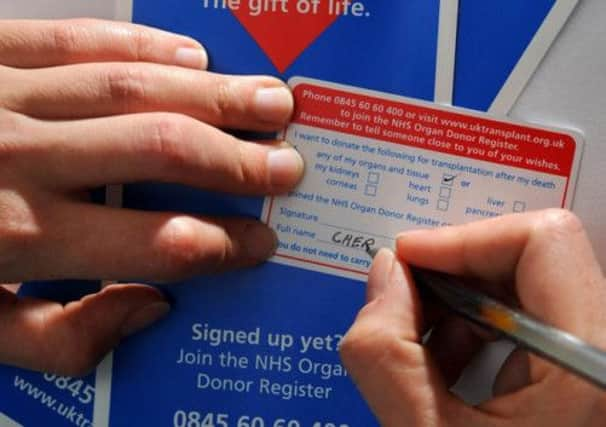Why torment of transplant waiting lists may lessen at last


Like thousands of others, Sue Lord is currently playing a waiting game.
The mother-of-four suffers from cardiomyopathy and the condition means her heart could stop at any time. Sue has already had a defibrillator fitted which automatically shocks the heart if it detects an abnormal rhythm, but the only cure for the condition would be a heart transplant.
Advertisement
Hide AdAdvertisement
Hide AdSue, who was diagnosed after collapsing while watching television five years ago, has been on the organ donor list since last February, but like all those waiting for transplants she knows there is no guarantee. The call could come tomorrow or the phone may never ring.
For obvious reasons, Sue and her husband Steve are among those calling for the organ donation system in Britain to be changed to an opt-out system. Under the plans it would be assumed that everyone was happy to donate and the onus would be on individuals who don’t to take themselves of the list.
“There just aren’t enough donors out there at the moment,” said Sue. “Until you’re put in the situation of needing an organ it’s not something you really give a lot of thought to.
“Before I got ill, I used to regularly donate blood and I was going to donate bone marrow, but I wasn’t on the organ donor register just because I never got round to it. People should automatically be put on the register to make organs available and help save lives.”
Advertisement
Hide AdAdvertisement
Hide AdThe testimony of those waiting for a transplant is always going to be compelling, but figures released by NHS Blood and Transplant earlier this week suggested that such a monumental change may not be necessary.
According to the organisation, the number of people donating organs after death has doubled in the last five years and over the last 12 months 1,200 people have donated organs. The sharp rise is the result of a new network of specialist nurses who support bereaved families and are trained to discuss the possibility of organ donation. The increase in donations has led to a 30.5 per cent boost in the number of people receiving a life saving or enhancing organ transplant and it has been described as a landmark event in the history of donation.
However, while the rise has been universally welcomed, the number of families refusing to grant consent remains among the highest in Europe and a number of charities believe that without the introduction of an opt-out system the number of donations will plateau.
“Even having met NHS targets for a 50 per cent increase in donations, people are still dying unnecessarily and our rate of organ donation is still low compared to many other European countries,” says a BHF spokesman.
Advertisement
Hide AdAdvertisement
Hide Ad“Although nine out of 10 people in the UK support organ donation, only three in 10 have joined the register. A soft opt-out system, where everyone is considered to want to donate their organs unless they state otherwise, would help increase donations and better reflect the wishes of the majority of the population.
“It would also provide people with an option to register their objection to organ donation which is simply not possible with the current system. It must be sufficiently robust to ensure that everyone who wishes to opt out has an opportunity to do so and close relatives must be able to refuse permission as the time of request.”
The British Heart Foundation recognises that any changes would have to be accompanied by an awareness campaign to ensure that the public were fully aware of their rights and responsibilities, but is backing a move by the Welsh Assembly to introduce an opt-out system there.
There are currently 7,300 people on the transplant waiting list, but many more are in need of new organs.
Advertisement
Hide AdAdvertisement
Hide Ad“The transplant waiting list would be larger if there were more donors available as a lot of people don’t get put on the waiting list if there chances of receiving a transplant are slim,”adds the BHF spokesman.
“Doctors don’t want to add to the anxiety of terminal illness. Heart transplant is the only effective treatment available for people with end stage heart failure – when the condition can’t be treated with medication – and it is usually successful in carefully selected patients.
“We do need to debate a change to the transplant system, but until then it is vital that people talk to their loved ones about their wishes because currently 40 per cent of families refuse donation simply because they unsure whether it’s the right thing to do or not.”